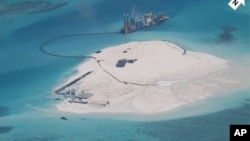New satellite imagery of a Chinese land reclamation project in disputed waters of the South China Sea is drawing new concern from the United States and the Philippines.
Chinese land reclamation projects in the South China Sea have been ongoing for years, but this month new satellite imagery of Fiery Cross Reef appears to show that China’s massive construction on the island will eventually mean it could support an airstrip.
The Philippines said the construction in an area of the South China Sea that Manila claims as its own raises tensions and is a reminder of the need to pass a long-anticipated Code of Conduct in the South China Sea.
The code is a proposed legal agreement among the 10-member Southeast Asian Nations (ASEAN) and China on how to peacefully handle disputes on competing claims in the South China Sea.
ASEAN guidelines needed
Department spokesman Charles Jose says the Chinese construction points to the need for ASEAN to pass guidelines on maintaining the status quo in the disputed region.
“Of course for us it’s something that raises tension in the area. And of course we would like to deescalate tension and we would like to manage tension in the area. That’s the reason why we are working with ASEAN and China,” he says.
Last week the defense and security analysis publication IHS Jane’s Defense Weekly released satellite images taken on November 14 of ongoing reclamation work at Fiery Cross, which is in the heart of the disputed sea. Fiery Cross is known as Yongshu in China and Kagitingan in the Philippines.
Apart from the Philippines and China, Brunei, Malaysia, Taiwan and Vietnam all have claims in the Spratlys and the wider South China Sea. The sea, which China claims almost entirely, is rich in marine life, potentially huge gas and oil reserves and is a heavily travelled trade route.
The Jane’s report says China is building what could be an airstrip and apron on the length of the newly re-shaped Fiery Cross. It also says the now 3,000-meter-long and more than 200-meter-wide island appears to have a harbor big enough for military craft.
US reaction
With the release of the report, a U.S. military spokesman called on China to stop reclamation work and instead work toward a diplomatic approach to restraining such activity.
On Monday, Major General Luo Yuan with China’s People’s Liberation Army called the criticism “irresponsible” in an interview with a state-run newspaper, saying the U.S. “is obviously biased considering that the Philippines, Malaysia, Vietnam have already set up military facilities.”
Rommel Banlaoi with the Manila-based Philippine Institute for Peace, Violence and Terrorism Research says Fiery Cross Reef is at the “epicenter” of the Spratlys and its location is “very strategic.”
“So if China decides to construct an airstrip in the area for military purposes, it can check Vietnamese, Malaysian and Philippine activities," Banlaoi says, "even all activities of the claimants in the area.”
An editorial in China’s state-backed Global Times newspaper Monday said the island showcases China’s “prominent construction capabilities,” and the Philippines and Vietnam “should get used to China’s island-construction in the South China Sea.”
Wu Shicun, president of National Institute for South China Sea Studies in Hainan Island, says the main function of the current expansion at Fiery Cross is to “improve working and living conditions” for the small Chinese population that lives around there.
But Wu says in three to five years an airstrip there could have a military purpose because China is leery of a recently signed agreement between the U.S. and the Philippines to have American military hardware pre-positioned here.
“China feels strategic pressure from neighboring countries and U.S. allies, particularly the Philippines," Wu states, "So China should have capabilities to protect its sovereignty, sovereign rights.”
Also Monday, a Philippines court found nine Chinese fishermen guilty of poaching and catching an endangered species in the South China Sea. The group was apprehended in May when police found more than 500 sea turtles on their boat in the disputed Spratly islands.
China has called their detention a “provocation” since Beijing claims the fishermen were in Chinese territorial waters. The Philippine court ordered each of the fishermen to pay some $103,000, but they were not sentenced to prison. If they cannot pay the fine, they will be sent to jail and will be eligible for release next May.






